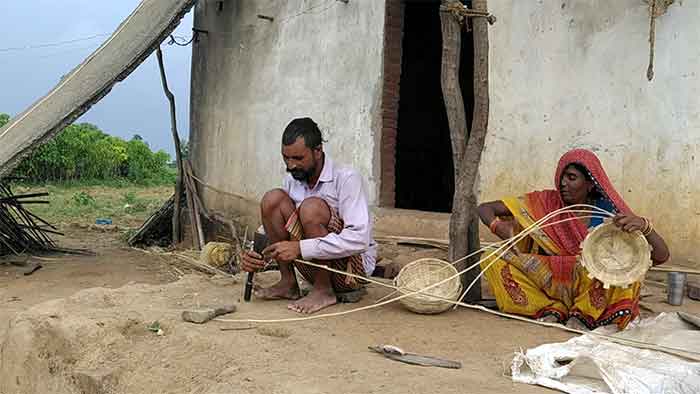
The Basor community of Madhya Pradesh and Uttar Pradesh are still reeling with the losses of the pandemic as it brought their business – making household items of bamboo – to a screeching halt. Depending upon benevolent supporters and NGOs for ration, the members of the Basor community, today have no alternative livelihood.
The popularity of plastic in the last 2 decades had already hampered their business as people made the big switch to using plastic baskets, boxes etc. much sooner than the community had time to innovate. Now with bamboo becoming more expensive, and the Covid pandemic snatching away all remaining opportunities of business, people of the Basor community are struggling to survive.
Phool Bai Basor, a bamboo artisan in Putrichhua village of Satna says that she is able to finish only 2-3 small baskets or 1 big basket per day, as everything is done by hand. But when she goes to the marketplace, she has to settle for a low price for her hard work as people prefer cheaper plastic items.
“Since the last decade, sales have gone down as people like to buy plastic products. They are cheaper and more durable. Wedding season is the time when we are able to do good business as many people buy these baskets and ‘supa’ (winnowing fan) to present fruits and gifts to the in-laws and guests. But with the pandemic weddings have also become smaller so since the last two years we have hardly made enough sales to buy bread,” she lamented.
Gulab Chandra Basor, state president Delhi, of the Akhil Bhartiya Basor Samaj Vikas Samiti says the condition of the people in Basor community is deteriorating and the pandemic made matters worse for them.
“The people of the community are uneducated and poor. They do not even have proper documents or ration cards. It was because of the NGOs and some social workers that they were able to survive the pandemic when they provided these families with food and cooking oil, else they would have starved. Many of them do not even have ration cards so they were unable to get the free ration from Public Distribution System (PDS),” he said.
Now that the lockdown has ended, the high price of bamboo is proving to be a big obstacle for the community members.
 “Cost of bamboo is sky rocketing. The artisans whose livelihood depends upon making bamboo items are barely able to feed their families. They are facing several challenges from purchasing costly bamboo to selling the items in the market at low prices. It takes a lot of time and effort to cut and shave the bamboo and then they start making the desired items, but their hard-work is not able to fetch them enough money to sustain,” he said.
“Cost of bamboo is sky rocketing. The artisans whose livelihood depends upon making bamboo items are barely able to feed their families. They are facing several challenges from purchasing costly bamboo to selling the items in the market at low prices. It takes a lot of time and effort to cut and shave the bamboo and then they start making the desired items, but their hard-work is not able to fetch them enough money to sustain,” he said.
Giving an estimate of the cost of the raw materials, he said that while the bamboo purchased from government vendors costs around Rupees 20 for a 10 feet long bamboo, the same costs Rupees 80 to Rupees 100 from private vendors.
“Bamboo in government nurseries is short in supply so most artisans have to turn to private vendors to buy bamboo for making these items. If they purchase 10 bamboos of 10 feet each, they have to spend Rupees 1000/- . After all their hard work in cutting and shaving the bamboo and then making baskets, supda, mats etc they have to sell the products at low costs to compete with the plastic items and are hardly able to make Rupees 2000-2500 in a week to 10 days. This is far less than the minimum wage and they are unable to provide for their families with such little money. They are hand to mouth,” he said.
Vijay Kumar Kundalekar, member of the Akhil Bhartiya Basor Samaj Vikas Samiti added that the pandemic created many more problems for the artisans after markets closed down due to the lockdown.
“All the markets were closed and all the public transport that allowed artisans from remote villages to go to cities to sell their products had stopped. They could only sell their items in the local village market where they did not get good rates. Even now when the markets have opened, they are still trying to make ends meet,” he added.
Uday Mahobia, resident of Chattarpur said that the people in his community are trying to recover from the problems the lockdown brought but if the third wave hits, he is not sure how they will bear a new blow to their livelihood.
“The condition was really bad. Many children have become malnourished because of eating plain rice with salt or plain chapatis without any dal or curry. People in this area are living in abject poverty and even on a good day, having three square meals is like a dream for them” Mahobiya said. “If the third wave strikes, they will be the worst hit.”
Members of the Akhil Bhartiya Basor Samaj Vikas Samiti had written to the central and state governments to provide some relief packages and provide the artisans with unemployment benefits to help them get back on their feet.
“We have appealed to the government but haven’t received an answer. Basors all across the country live below the poverty line and are discriminated against by the higher castes. They are denied opportunities and sometimes are also shooed away from public hand-pumps and temples. Their condition is dire and the social evils add to their woes. I request the state and central governments to address their needs and provide them with more employment opportunities so that they can have better lives,” added Basor.
Kundalekar further said that because of social discrimination and loss of livelihood, youngsters of the community are giving up their traditional livelihood and opting to work as labourers or migrating to cities in search of menial jobs.
“The youth do not want to carry on this tradition as they have seen their parents struggling to provide them two square meals a day. Many have started working in the fields under big farmers where they make a minimum wage, while some have started working as cleaners and waiters in cities. The Basors are not aware of several government schemes due to the high rate of illiteracy and so are unable to benefit from them. If this continues, we will lose this traditional art forever,” he added.
Shuchita Jha is a Bhopal-based freelance journalist










































